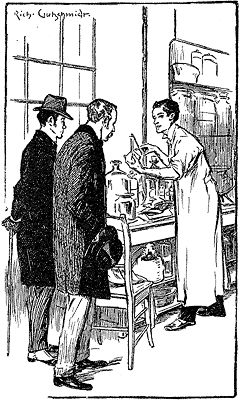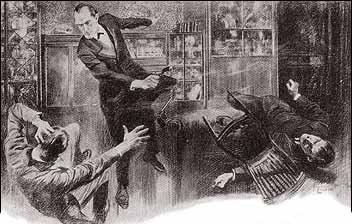"The best literary work is that which leaves the reader better for having read it. Now nobody can possibly be the better – in the high sense in which I mean it – for reading Sherlock Holmes, although he may have passed a pleasant hour in doing so. It was not to my mind high work, and no detective work ever can be, apart from the fact that all work dealing with criminal matters is a cheap way of rousing the interest of the reader." (Sir Arthur Conan Doyle)
Sherlock Holmes ruined my life. But he also saved it. Because of Sherlock Holmes, I now know more about the world, the people in it, and myself. Previously a curious and avid student, Sherlock Holmes has made me compulsive about learning to an obsessive degree. I think differently, and more often, but to be fair, I’m usually thinking about a particular subject. And the things I know aren’t always something everyone would find particularly interesting, useful or necessary to everyday life. Some people would call it superfluous knowledge. These aren’t always scholarly or erudite facts, either. But some of them are. Nor has it always been a lofty or cerebral education. But some of it has been. And now as I stand at the precipice of 100 blog posts (well… sit, really, as Frederic Dannay was sitting… I’m sitting at my computer), I’m prepared to admit to the dichotomy. I’m here with hat in hand (not a deerstalker, rather more like a homburg, as we all know) and confess that the Great Detective is both the best and worst thing that ever happened to me.
I’m sure that some of Sherlock Holmes’s canonical clients would say much the same thing. While Holmes might have been able to solve whatever mystery they first approached him with, the explanation may have ultimately exposed something that they would rather the world have not known, something that they would never have willingly revealed to others, or simply something that they would rather have not realized about themselves. In “The ‘Gloria Scott’”, one of Holmes’s very first cases, Victor Trevor undoubtedly felt relief that Holmes was able to explain what happened to his father – the real identity of Hudson and the reason for the shadow he cast over the elder Trevor’s life – and the reason for his father’s fatal reaction to a seemingly innocuous letter. But ultimately Holmes’s explanation revealed uncomfortable facts about his father’s past – things that would be even more unsettling and disturbing now that Victor’s father was no longer alive to discuss them. There may been a solution for Victor Trevor, but there would never be any closure. Likewise Violet de Merville of “The Adventure of the Illustrious Client” probably felt no joy that her fiancé, the villainous Baron Gruner, was unquestionably revealed as an utter blackguard by Sherlock Holmes – but eventually there must have been relief at the disastrous future that she so narrowly avoided.
And no one was more versed in the disparity of life and human nature than Sherlock Holmes. As he said to Dr. Watson: “I assure you that the most winning woman I ever knew was hanged for poisoning three little children for their insurance-money, and the most repellent man of my acquaintance is a philanthropist who has spent nearly a quarter of a million upon the London poor” (SIGN). But being aware of that disparity doesn’t mean he was always able to correctly assess it. In “The Yellow Face,” the Detective is quite convinced of his own theory: that Mrs. Munro’s first husband is the occupant of the mysterious cottage and he is an unscrupulous blackmailer. The climax of the story reveals both Sherlock Holmes’s failings, and that the occupant of the cottage is Mrs. Munro’s daughter from her first marriage. The Detective had assumed the worst, and Mr. Munro neatly assesses the situation in saying: “I am not a very good man, Effie, but I think that I am a better one than you have given me credit for being.”
The Detective himself is a study in contradictions. Who among Sherlockians doesn’t know that “…although in his methods of thought he was the neatest and most methodical of mankind, and although also he affected a certain quiet primness of dress, he was none the less in his personal habits one of the most untidy men that ever drove a fellow-lodger to distraction” (MUSG)? The actors who have portrayed Sherlock Holmes over the years have usually been rather adept at capturing both sides of the Detective’s personality. Most recently in his turn as the Great Detective, Benedict Cumberbatch sports immaculately tailored suits and coats (and, for some reason, shirts that that appear expensive, if a size too small) – but keeps severed heads and other assorted body parts in the refrigerator. And who can forget the incomparable Jeremy Brett crawling through an ever-growing sea of papers in the Baker Street sitting room – his hair sleeked back into a sharp widow’s peak, his cuffs and collars spotlessly white, his suit somehow inexplicably remaining wrinkle-free despite his exertions?
In addition, Holmes was ever inconsistent when it came to personal relationships. In “A Scandal in Bohemia,” Watson says, “Grit in a sensitive instrument, or a crack in one of his own high-power lenses, would not be more disturbing than a strong emotion in a nature such as his.” And in “The Five Orange Pips,” Holmes pronounces that he has no friends, except for Dr. Watson. All of this proves to be profoundly untrue. During 56 short stories and 4 novels, the reader learns of the Detective’s other friends, such as Victor Trevor (GLOR), a companion from Holmes’s university days. Even more significantly, over the course of the Canon, the Detective’s relationship with Inspector Lestrade evolves and eventually he comes to refer to the Scotland Yard inspector as “Friend Lestrade” (NOBL, CARD, EMPT, NORW, 3GAR). And of course, all readers remember how in “The Adventure of the Three Garridebs,” Watson sees all his “years of humble but single-minded service culminated” in a grand moment of revelation.
As such, I’ve found many Sherlockians to be the same – not inconsistent, but definitely contradictory. I include myself in that lot, of course. We pursue endlessly obscure topics, isolate ourselves during our researches, and hold fast to our theories when we believe ourselves to be right. We wait for our grand moment of revelation, a sign that all of our efforts have not been in vain. But in the end, we seek each other out. And such relationships are unique unto Sherlockiana, and often profound, because as C.S. Lewis said, “Friendship is born at that moment when one person says to another: What! You too? I thought I was the only one.”
I say that Sherlock Holmes is both the best and worst thing that ever happened to me, because he’s revealed the best and worst things about me. Surely my husband, who no longer remembers the color of our carpet, so covered in books it has become, would tell you that the Great Detective has revealed my slightly more compulsive and obsessive tendencies (and for the record, the carpet is grey… no, beige… taupe?). But I have also learned the most spectacular things, met some of the best and wisest people, and my life has been profoundly changed. I’m not the person I was before I met Sherlock Holmes, but I am the person I was meant to be. Such as I am.
oOo
“Better Holmes & Gardens” has its own Facebook page. Join by “Liking” the page here, and receive all the latest updates, news, and Sherlockian tidbits.




Lovely post, Jaime! As a Sherlockian newbie, I know that I've enjoyed meeting others like you who are more knowledgeable than me and yet never make me feel dumb with my questions. Here's to new friendships!
ReplyDeleteThis is a lovely blog, it is lovely that Sherlock can change so many people's lives and he is a fictional character! I work for a murder mystery company (www.murdermysteryevents.com) and he is always the most popular plot!
ReplyDelete